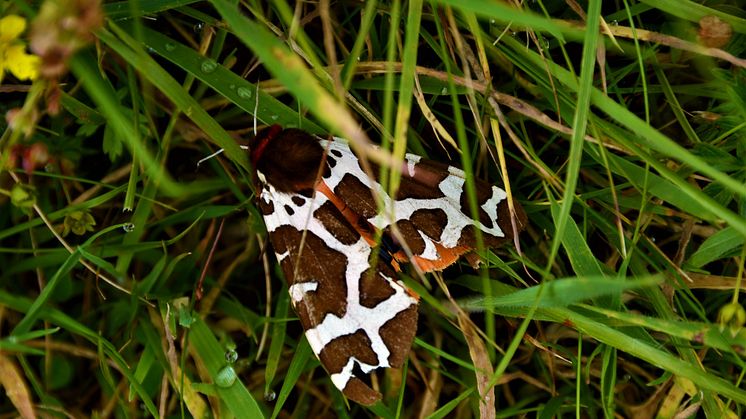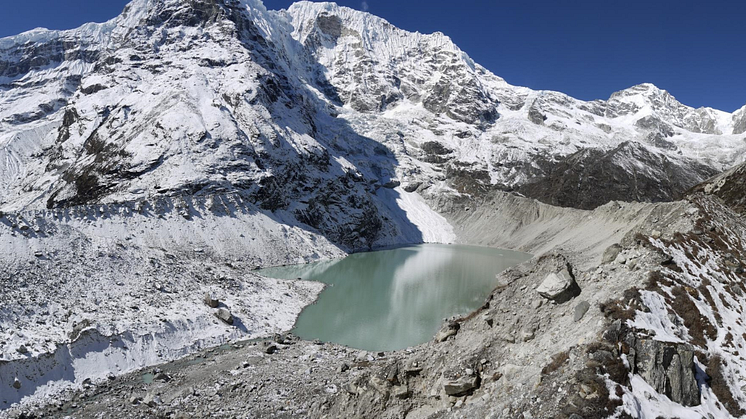
Press release -
More focus on water management could save moths threatened by climate change in Britain
New research from wildlife charity Butterfly Conservation and Northumbria University has shown that moths adapted to cooler conditions are being lost from parts of Britain as a result of climate change.
Around 10 per cent of the larger, so-called ‘macro’ moth species in Britain are currently restricted to areas and habitats with cooler climates. Unsurprisingly, most of these species occur in the northern parts of Britain, but some occur in the south too, especially on hills and moors. Most of these moths have declined in distribution over recent decades, leading to concerns that climate change could be driving these species to extinction.
Scientists including Dr Andy Suggitt from Northumbria – an ecologist who specialises in climate change – have now discovered that increasing the amount of water within habitats could be key to saving these species from rising temperatures.
Researchers looked at data gathered over a 40-year period by volunteers of Butterfly Conservation’s National Moth Recording Scheme. The results showed that, on average, cool-adapted moths have retreated towards the North West, tracking the changing climate, with some species dying out completely in more southerly and easterly parts. The garden tiger moth (Arctia caja) is a typical example of this decline: its numbers fell by some 89 per cent between 1968 and 2002.
The study also showed that, particularly where temperatures were high, the threat to the moths was greatly reduced where the annual rainfall amount was also high. This is believed to be because the plants that the moths’ caterpillars rely upon for food survive better under warming temperatures when there is more rainfall, and thus, more water available in the environment.
Dr Suggitt, from Northumbria's department of Geography and Environmental Sciences, said: “Our research suggests that we should take another look at how we manage water in the landscape, particularly in the south and east of Britain, where warming has been more extreme.”
Changes in habitat management such as reducing overgrazing, slowing the flow of rivers, and blocking drainage ditches on peatlands could help retain water and benefit moths and other wildlife, as well as increasing carbon capture and reducing flooding.
“As the recent IPCC (Intergovernmental Panel on Climate Change) report concluded, species have responded remarkably consistently to warming temperatures – and we know this will ultimately result in a heightened risk of extinction for many species,” added Dr Suggitt. “But the picture has been less clear at the warmer edges of species’ ranges. Our new study contributes a small but important piece of that puzzle, whilst also offering a tangible option for conservation managers and practitioners to fight climate change by introducing relatively modest changes to water management.”
Postdoctoral Researcher at Butterfly Conservation, and lead author of the study, Dr Lisbeth Hordley said: “Cold-adapted species, like the British moths in our study, are likely to be the first to struggle as the climate warms. Unfortunately, as climate change worsens, more areas in Britain will see the high temperatures that are driving these moths to extinction, so adapting land management to increase water retention is even more important to safeguard such species.”
Dr Richard Fox, Head of Science at Butterfly Conservation and also a co-author of the research added: "Thanks to the efforts of thousands of volunteer moth recorders over the past 40 years, we now know that there is a strong link between warming temperatures and the decline of many species that live in cooler parts of Britain. Although that's really bad news for the insects, the records gathered by these citizen scientists have also shown how we can increase the resilience of these species, at the same time as benefiting people, by retaining more water in river catchments.
“Existing Butterfly Conservation projects such as the Bog Squad, which is re-wetting damaged peat bogs in Scotland, are already providing such benefits but much more is required to protect wildlife and people as the climate crisis grows.”
You can read more details on the research in a paper published in the prominent academic journal, Ecology Letters, here. Studies on the topic are continuing with further research from experts and Butterfly Conversation and Northumbria University expected in the summer.
Topics
Categories
UNIVERSITY OF THE YEAR 2022 (Times Higher Education Awards)
Northumbria is a research-intensive university that unlocks potential for all, changing lives regionally, nationally and internationally. Find out more about us at www.northumbria.ac.uk
--- Please contact media.communications@northumbria.ac.uk with any media enquiries or interview requests ---













